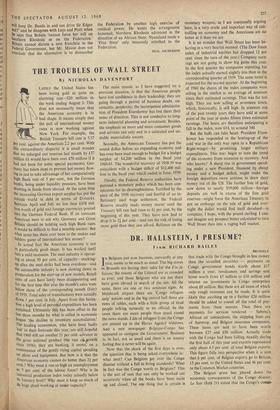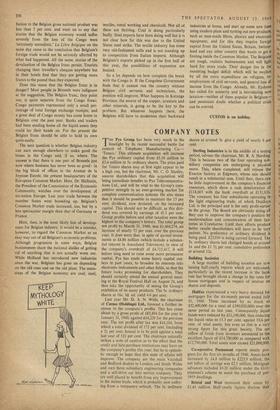DR. HALLSTEIN, I PRESUME?
From RICHARD BAILEY
BRUSSELS
N Belgium just now business, outwardly at any Irate, seems to be much as usual. The big stores in Brussels are having their sales for the Fin de - Saloon; the resorts of the Littoral are as crowded as ever; and those Belgians who are not there have gone abroad in search of the sun. All the same, there are one or two ominous signs. At Melsbroek airport there are 'Congo refugees only' notices and in the big central hall there are rows of tables, each with a little group of tired people talking earnestly to an official. In the town there are more people than usual round the news stands. Lists of refugees from the Congo are pinned up in the Havas Agency windows. And a new newspaper Belgique-Congo has appeared to castigate the Government. Business is, in fact, not as usual and there is an uneasy feeling that it never will be again.
Now that the shock of the first days is over, the question that is being asked everywhere is: what next? Can Belgium get over the Congo disaster without a fall in living standards? What in fact was the Congo worth to Belgium? This is the sort of sum that can only be worked out accurately when all the books have been made up and closed. The one thing that is certain is that trade with the Congo brought in less money than the so-called invisibles.— payments on Congo government bonds Worth about £17 million a year; remittances and savings sent home worth from £7 million to £10 million and interest on investments in Congo enterprises about £8 million. But these are all items of which only rough estimates can be made. It is quite likely that anything up to a further £20 million should be added to round off the total of pay- ments from these sources. Then there arc payments for services rendered — Sabena's African air connections, the shipping lines out of Antwerp, and Belgian insurance companies. These items are said to have been worth between £25 and £30 million. Actually trade with the Congo had been falling steadily during the first half of this year and exports represented only about 4.5 per cent. of total Belgian exports. This figure falls into perspective when it is seen that 6 per cent. of Belgian exports go to Britain, 13 per cent. to the United States and 46 per cent. to the Common Market countries. , The Belgian press has played down the economic consequences of the Congo disaster. Le Soir (July 21) stated that the Congo's conuri-
bution to the Belgian gross national product was less than 5 per cent. and went on to say that stories that the Belgian economy would suffer severely from the loss of the Congo were 'extremely unrealistic.' La Libre Belgique on the same day came to the conclusion that Belgium's foreign trade would not be seriously affected by what had happened. All the same, stories of the devaluation of the Belgian franc persist. Tourists changing their traveller's cheques anywhere but in their hotels find that they are getting more francs to the pound than they expected.
Does this mean that the Belgian franc is in danger? Most people in Brussels were indignant at the suggestion. The Belgian franc, they point out, is quite separate from the Congo franc; Congo payments represented only a small per- centage of total foreign exchange receipts; and a great deal of Congo money has come home to Belgium over the past year. Banks and traders had been sending home all the liquid assets they could lay their hands on. For the present the Belgian franc should be able to hold its own quite easily.
The next question is whether Belgian industry can earn enough elsewhere to make good the losses in the Congo and, if so, where. The answer is that there is one part of Brussels just now where business has never been so good: in the big block of offices in the Avenue de la Joyeuse Entrée, the present headquarters of the European Common Market. Here, Dr. Hallstein, the President of the Commission of the Economic Community, watches over the development of six-nation Europe. Last year trade between the member States went bounding up. Belgium's Common Market trade increased, too, but by a less spectacular margin than that of Germany or France.
Here, then, is the most likely line of develop- ment for Belgian industry. It would be a mistake, however, to regard the Common Market as an easy way out of all Belgium's economic problems. Although progressive in some ways, Belgian businessmen share the national dislike of getting rid of anything that is not actually worn out. While Holland has introduced new industries since the war, Belgium has gone on depending on the old ones and on the old plant. The main- stays of the Belgian economy are coal, steel, textiles, metal working and chemicals. Not all of these are thriving. Coal is doing particularly badly. Steel exports have been doing well but it is not clear how far this was due to the United States steel strike. The textile industry has some very old-fashioned mills and is not standing up to competition from Italian imports. Although Belgium's exports picked up in the first half of this year, the possibilities of expansion are, limited.
So a lot depends on how complete the break with the Congo is. If the Congolese Government finds that it cannot run the country without Belgian civil servants and technicians, the position will improve. What happens in Katanga Province, the source of the copper, uranium and other minerals, is going to be the key to the problem. But whatever happens there, the Belgians will have to modernise their backward
industries at home, and start up some new lines using modern plant and turning out new products, such as man-made fibres, plastics and electroniC equipment, and for this they require foreign capital from the United States, Britain, Switzer- land and any other country that wants to get $ footing inside the Common Market. The Belgians are tough, realistic businessmen and will fight hard for more trade. Their danger lies in the mounting budget deficit which will be swollen by all the extra expenditure on refugees, re- employment of civil servants, and general loss of income from the Congo. Already, Mr. Eyskens has called for austerity and is introducing new taxation—neither of them popular in Belgium— and pessimists doubt whether a political crisis can be averted.
CUSTOS is on holiday.



































 Previous page
Previous page